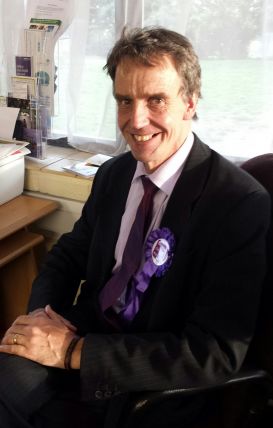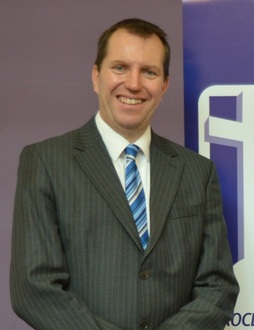Niche interest groups or a solid political option? Meet the UK's two Christian political parties
Unless you're a keen follower of Britain's minor political parties, it may be news to you that there are two Christian ones in the UK.

There is a strong tradition of Christian Democratic parties in Europe, but these are a slightly different breed: people who are unashamedly 'Christian' in their outlook and language; whose policies are particularly targeting what they perceive to be Christian issues, and whose party membership requires a statement of faith.
The Christian Peoples Alliance (CPA), established in 2000, and the Christian Party, set up in 2005 after a split from the CPA. The two parties may well merge again after the general election, but for now, their manifestos have a number of similarities, and they have promised not to stand against each other. Happily, this isn't particularly tricky, as the CPA is concentrated in London, and the Christian Party is more spread out, with branches in Wales and Scotland.
Both parties have had a somewhat turbulent history. The split happened after the CPA's Scottish branch put forward a Muslim candidate. More recently, the Christian Party was threatened with closure by the Electoral Commission over failing to provide their accounts. But both parties are now under new leadership and are hoping for a brighter future. They argue that they are bringing issues to the table that none of the other parties are talking about – such as traditional marriage, the sanctity of life and the persecution of Christians.
The CPA's headline policies include a £10,000 grant when you get married, on the condition that you go for at least three sessions of marriage preparation counselling. And another £5,000 grant on the birth of your first child if it is born within wedlock, and if you go for three sessions of training in 'child rearing'. Party leader Sid Cordle says that these policies are aimed at making it "foolish" not to get married and have children within the context of marriage.
When it comes to the sanctity of life, the CPA's long-term goal would be to seek to repeal the 1967 Abortion Act, something that would be done step by step – but they'd seek to take immediate action to look at support for mothers.
Regarding persecution, Cordle says his party wants to see international aid more closely linked to a country's human rights record, particularly where religious persecution is concerned. "We're giving £338 million in aid to Pakistan and they've got Asia Bibi in prison sentenced to death for death for saying 'Jesus Christ died on the cross for my sins, what's Muhammed ever done for you?'
"If we can say to Uganda we're not giving you aid because of your laws on homosexuality, we can say to Pakistan we're not giving you aid because of the way you're treating Christians," Cordle adds.

The parties share a concern about discrimination closer to home too. Christian Party leader Jeff Green is a councillor Llandrindod Wells in Powys, Wales, and former mayor. Together with his wife Sue, he runs a bed and breakfast which faced a challenge from the Equality and Human Rights Commission over their policy about same-sex couples not sharing double rooms.
The Greens took their case to the European Court of Human Rights because they believe Christians are under attack in the UK. "We're being targeted by the state," he says. "It's going to get worse for us. And Christians can either capitulate, compromise or make a stand."
A key policy for the Christian Party is banking reform. Green, who describes himself as a "compassionate capitalist", foresees a bleak future for the country's finances on its current track – saying that the coalition government has failed to talk about the increase in the national debt. "This is the reality of why Christians need to be engaged in the political process... there are things that are going to happen to our country that are not going to be good and we have to be the people out there telling them that 'This is coming'." He sees this Christian responsibility because we are called 'keep watch' and warn people about what's going to happen.
Green says the banking crisis happened because "we took away the Christian compassion and conscience" and so lost the idea that those who made money would give back to society. "That has been eradicated from our nation... and needs to be put back," he says. "You can't take away the Christian conscience and try to legislate in its place."
Of course the reality in the general election is that these are largely theoretical policies – Green admits they have a "million to one" chance of winning a Westminster seat.
So what's the point of standing? Cordle says his strategy takes inspiration from UKIP's rise in recent years. "What they've done is project the party by having lots of candidates in elections. They managed to stand 400 candidates (495 in 2005), none of them got more than 3,000 votes, most only got a few hundred... but it got the party noticed."
His aim is to focus on putting forward good candidates for the London assembly next year. "This year is all about publicity," he says. They are hoping to build from the 50,000 votes they achieved in the European Parliament election last year, and are particularly focussing on next year's election for the London Assembly.
Similarly Green says he's using the election as an "awareness campaign" for Christians, to help people realise that the party is operating at all levels, and to encourage Christians to "reengage with the political process".
The CPA's shoestring budget has limited the number of candidates they have been able to put forward, as candidates have had to pay the £500 deposit required to stand for themselves. The party had originally hoped to have 28 candidates, but have instead ended up with 17 – a number that Cordle says is "disappointing".
The Christian Party had 71 candidates stand in the 2010 election, and (on a joint ticket with the CPA) achieved 250,000 votes at the European Parliament election in 2009, but has just nine candidates standing in the general election. Green says this is largely owed to the fallout from the previous leadership, and doesn't seem too phased by starting again from smaller beginnings.
One strategy they've used this year to increase their influence is introducing a 'Declaration of British Values' – a list of four statements that candidates from other parties can choose to sign. It includes a commitment to ensuring the right for 'Christian conscience', namely protecting religious freedom for Christians in the UK; a commitment to an in-out referendum on Britain's membership of the EU; pledging to support 'real marriage'; and working to protect the sanctity of life.
Green says it's intended to show Christians who they can vote for, something he often receives inquiries about. With the exception of members from the Christian Party and the CPA, so far six MPs from the other parties have signed the declaration.
But while they are happy to point Christians to people who support their views, the ultimate goal is to strengthen the Christian parties themselves. Green says he respects Christians who stand for the major parties, but adds that it isn't long before they have to surrender to the power of the party whips. He predicts that within the next five years Christians will find it increasingly difficult to stay aligned with the major political parties. He observes from those who have joined the Christian Party from the Scottish National Party and the UK Independence Party that "the closer they get to Westminster, the more they seem to have to accept the party line."
Conversely, Green says that a defining feature of his party's manifesto is that they believe it is "scripturally based". "We are not affected by the ebbs and flows of social media, or Europe. The Word is the Word, and we stick to it. We have that rock that we can cling to."











